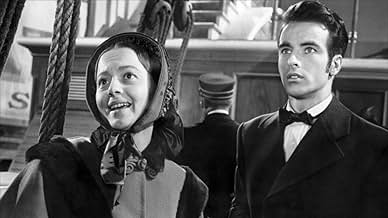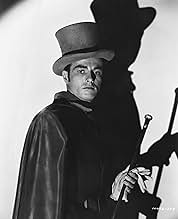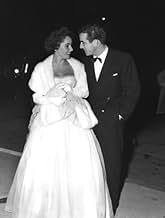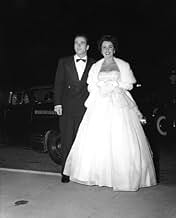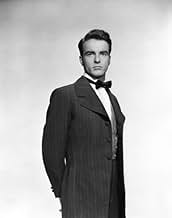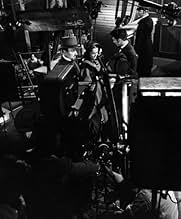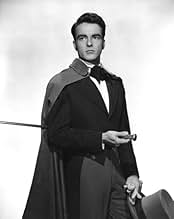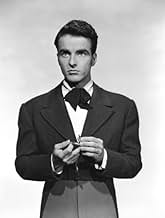IMDb रेटिंग
8.1/10
18 हज़ार
आपकी रेटिंग
एक युवा भोली महिला एक सुंदर युवक के प्यार में पड़ जाती है जिसपर उसका गालीबाज़ पिता शक करता है, वह शादी के लिए धनी लड़की की तलाश में है.एक युवा भोली महिला एक सुंदर युवक के प्यार में पड़ जाती है जिसपर उसका गालीबाज़ पिता शक करता है, वह शादी के लिए धनी लड़की की तलाश में है.एक युवा भोली महिला एक सुंदर युवक के प्यार में पड़ जाती है जिसपर उसका गालीबाज़ पिता शक करता है, वह शादी के लिए धनी लड़की की तलाश में है.
- 4 ऑस्कर जीते
- 13 जीत और कुल 9 नामांकन
Mary Bayless
- Party Guest
- (बिना क्रेडिट के)
Nan Boardman
- French Maid
- (बिना क्रेडिट के)
Jack Chefe
- French Waiter
- (बिना क्रेडिट के)
Marcel De la Brosse
- French Porter
- (बिना क्रेडिट के)
Ray De Ravenne
- French Waiter
- (बिना क्रेडिट के)
फ़ीचर्ड समीक्षाएं
Rewatching The Heiress after remembering nothing but great things about it, the film was every bit as brilliant as remembered and even better in fact. It is one of William Wyler's best, in a list that includes Ben-Hur, Roman Holiday and Dodsworth, and while there are some fine film adaptations of Henry James' work, like The Innocents and The Wings of a Dove my vote for the best goes to this, The Heiress.
Visually, it looks absolutely beautiful and is rich in atmosphere. The Gothic set design is atmospheric and strikingly handsome (never getting in the way of the characters or the story), the costumes are elegantly evocative, the shadowy lighting adds so much to the atmosphere without making it obvious and The Heiress really does have to be one of the most exquisitely shot films of the late 40s, not only being very easy on the eyes but also very expansive which allows us to really be part of the action and be really engrossed in how all the characters interact with one another. Aaron Copland's haunting Oscar-winning score is some of his best work, and Wyler directs immaculately, his work worthy of winning the Oscar rather than just being nominated.
The Heiress is also superbly scripted, with sharp, sometimes cruel but always compellingly realistic, dialogue, the subject matter explored intelligently, poignantly and sometimes chillingly. The story is chillingly intense and also absorbingly intimate, always powerful and never less than interesting, while the characters actually feel like real people (Morris is the least interesting one of the bunch, but only because of how compellingly written Catherine and Dr Sloper are. Wyler is also well-known for drawing out great performances and ensemble work, and not only do we get both here across the board but they're more than great. Olivia de Havilland won her second Oscar for this film, and it was richly deserved, it is a very meaty role with a character transformation from shy to cruel that could have rung false but de Havilland plays the shyness with poignant nuance and the cruelness to spine-chilling effect, by far my favourite performance from her.
Montgomery Clift has had more interesting characters in his career, but he plays the role with control and subtlety, even also with an unsettling ambiguity as well. Ralph Richardson, like de Havilland, also delivers his finest screen work in this film, the character's coldness played to perfection. Dr Sloper and Catherine's father/daughter relationship is somewhat the core of the film and is played with brilliant passion by both Richardson and de Havilland. Miriam Hopkins is amusing and charming, but in a way that doesn't jar at all, despite how it sounds in comparison to the story.
In conclusion, a brilliant film, one of Wyler's best films and the finest screen adaptation of Henry James with career-best work from de Havilland and Richardson. 10/10 Bethany Cox
Visually, it looks absolutely beautiful and is rich in atmosphere. The Gothic set design is atmospheric and strikingly handsome (never getting in the way of the characters or the story), the costumes are elegantly evocative, the shadowy lighting adds so much to the atmosphere without making it obvious and The Heiress really does have to be one of the most exquisitely shot films of the late 40s, not only being very easy on the eyes but also very expansive which allows us to really be part of the action and be really engrossed in how all the characters interact with one another. Aaron Copland's haunting Oscar-winning score is some of his best work, and Wyler directs immaculately, his work worthy of winning the Oscar rather than just being nominated.
The Heiress is also superbly scripted, with sharp, sometimes cruel but always compellingly realistic, dialogue, the subject matter explored intelligently, poignantly and sometimes chillingly. The story is chillingly intense and also absorbingly intimate, always powerful and never less than interesting, while the characters actually feel like real people (Morris is the least interesting one of the bunch, but only because of how compellingly written Catherine and Dr Sloper are. Wyler is also well-known for drawing out great performances and ensemble work, and not only do we get both here across the board but they're more than great. Olivia de Havilland won her second Oscar for this film, and it was richly deserved, it is a very meaty role with a character transformation from shy to cruel that could have rung false but de Havilland plays the shyness with poignant nuance and the cruelness to spine-chilling effect, by far my favourite performance from her.
Montgomery Clift has had more interesting characters in his career, but he plays the role with control and subtlety, even also with an unsettling ambiguity as well. Ralph Richardson, like de Havilland, also delivers his finest screen work in this film, the character's coldness played to perfection. Dr Sloper and Catherine's father/daughter relationship is somewhat the core of the film and is played with brilliant passion by both Richardson and de Havilland. Miriam Hopkins is amusing and charming, but in a way that doesn't jar at all, despite how it sounds in comparison to the story.
In conclusion, a brilliant film, one of Wyler's best films and the finest screen adaptation of Henry James with career-best work from de Havilland and Richardson. 10/10 Bethany Cox
The Heiress (1949)
Another gem from William Wyler. This is the director of so many sparkling, flawless interpersonal dramas it's hard to believe he isn't lionized alongside more famous greats. The problem (as he admits in interviews) is he had no real style of his own. And yet, as the years go by, his "style" begins to clarify a little. Watch "The Little Foxes" or "Detective Story" or this one, "The Heiress," and you'll see an astonishing, complex handling of a small group of people with visual clarity and emotional finesse.
There is no overacting here, and no photographic flourishes to make you gasp. There are no murky shadows or gunfights or even ranting and raving. No excess. What you have here is terrific writing (thanks in part to Henry James who wrote the source story, Washington Square) and terrific acting.
The three leads are all first rate actors, surely. Montgomery Clift a young and rising star, Olivia de Havilland already famous for earlier roles (including a supporting one in "Gone with the Wind"), and the terrific stage actor Ralph Richardson, who received an Oscar nomination for his role. It is de Haviland who is the heiress of the title, and she does tend to steal the show with a performance that you would think would tip into campy excess but which just veers this side of danger and makes you feel for her scene after scene. And she took the Best Actress award for it.
A good director manages to bring the best from the actors, which Wyler clearly does. But he also finds ways to make those performances jump out of the film reality into the movie theater. His fluid, expert way of moving actors around one another, of having them trade positions or look this way or that as they deliver some intensely subtle comeback line, is really astonishing. And easy to miss, I think, if you just get absorbed in the plot. So watch it all.
The story itself is pretty chilling and oddly dramatic (dramatic for Henry James, not for Wyler, who likes a kind of soap opera drama within all his focused restraint). The heiress (de Havilland) is being pursued by a fortune hunting and rather handsome man (Clift) and she doesn't realize his love isn't for real. But the father, with his slightly cruel superiority, sees it all and tries to subtly maneuver his daughter to safety. The result is a lot of heartbreak and surprising twists of motivation.
By the end almost anything can happen, within this upper class world of manners and appropriate reactions, and de Havilland rises to the challenge. It's worth seeing how. Terrific stuff from the golden age of the silver screen, for sure.
Another gem from William Wyler. This is the director of so many sparkling, flawless interpersonal dramas it's hard to believe he isn't lionized alongside more famous greats. The problem (as he admits in interviews) is he had no real style of his own. And yet, as the years go by, his "style" begins to clarify a little. Watch "The Little Foxes" or "Detective Story" or this one, "The Heiress," and you'll see an astonishing, complex handling of a small group of people with visual clarity and emotional finesse.
There is no overacting here, and no photographic flourishes to make you gasp. There are no murky shadows or gunfights or even ranting and raving. No excess. What you have here is terrific writing (thanks in part to Henry James who wrote the source story, Washington Square) and terrific acting.
The three leads are all first rate actors, surely. Montgomery Clift a young and rising star, Olivia de Havilland already famous for earlier roles (including a supporting one in "Gone with the Wind"), and the terrific stage actor Ralph Richardson, who received an Oscar nomination for his role. It is de Haviland who is the heiress of the title, and she does tend to steal the show with a performance that you would think would tip into campy excess but which just veers this side of danger and makes you feel for her scene after scene. And she took the Best Actress award for it.
A good director manages to bring the best from the actors, which Wyler clearly does. But he also finds ways to make those performances jump out of the film reality into the movie theater. His fluid, expert way of moving actors around one another, of having them trade positions or look this way or that as they deliver some intensely subtle comeback line, is really astonishing. And easy to miss, I think, if you just get absorbed in the plot. So watch it all.
The story itself is pretty chilling and oddly dramatic (dramatic for Henry James, not for Wyler, who likes a kind of soap opera drama within all his focused restraint). The heiress (de Havilland) is being pursued by a fortune hunting and rather handsome man (Clift) and she doesn't realize his love isn't for real. But the father, with his slightly cruel superiority, sees it all and tries to subtly maneuver his daughter to safety. The result is a lot of heartbreak and surprising twists of motivation.
By the end almost anything can happen, within this upper class world of manners and appropriate reactions, and de Havilland rises to the challenge. It's worth seeing how. Terrific stuff from the golden age of the silver screen, for sure.
To call this film well-acted is like calling "Citizen Kane" a nice movie and Alfred Hitchcock an "okay" director. William Wyler was known for eliciting excellent performances from his actors (he's responsible for them receiving a record 14 Oscars in acting; more than twice as many as any other director) and in "The Heiress" he's in top form. This movie should be played in every acting class ever taught to show the brilliance of subtlety and range of expressions possible when one is conveying a character's inner emotions.
Olivia De Havilland is a beautiful woman, but you believe she's an ungainly bundle of shy awkwardness in the role of Catherine Sloper. And her transformation to a cruel wounded creature is perfectly believable. And Ralph Richardson as Dr. Sloper and Miriam Hopkins as Aunt Lavinia are letter perfect beside her. Sir Ralph (at least, I THINK he was knighted) can do more with stillness and a flick of an eyebrow than any actor I've ever seen (including Brando, Penn and any other method actor you care to toss into the mix). He was robbed at the Oscars.
Montgomery Clift was beautiful and seductive and, except for a couple of moments where he seemed too 1950s instead of 1850s, just right for the part. He almost holds his own with Sir Ralph when they meet to discuss him marrying Catherine, but he did do better work in "A Place In The Sun" and "From Here To Eternity."
Wyler's simplicity and grace in directing only enhanced the story. The use of mirrors to deepen emotional content (as in when Dr. Sloper, now ill, goes to his office after getting the cold shoulder from Catherine) is stunning. So is his willingness to let a scene play out rather than force along the pacing of the moment, as so many directors do, today (as in when Catherine offers to help her father rewrite his will).
There are no easy answers in this movie. You can think Dr. Sloper is right about Morris and only wants to protect his daughter, or you can see his actions as those of a vindictive man who blames her for the death of his beloved wife (in childbirth). Morris could be a fortune hunter, or he could be a man who does care for Catherine, in his own way, and would make her happy. Or all of the above. The whole movie is so beautifully composed, it's breathtaking. A definite must see for anyone who appreciates great stories well-told.
Olivia De Havilland is a beautiful woman, but you believe she's an ungainly bundle of shy awkwardness in the role of Catherine Sloper. And her transformation to a cruel wounded creature is perfectly believable. And Ralph Richardson as Dr. Sloper and Miriam Hopkins as Aunt Lavinia are letter perfect beside her. Sir Ralph (at least, I THINK he was knighted) can do more with stillness and a flick of an eyebrow than any actor I've ever seen (including Brando, Penn and any other method actor you care to toss into the mix). He was robbed at the Oscars.
Montgomery Clift was beautiful and seductive and, except for a couple of moments where he seemed too 1950s instead of 1850s, just right for the part. He almost holds his own with Sir Ralph when they meet to discuss him marrying Catherine, but he did do better work in "A Place In The Sun" and "From Here To Eternity."
Wyler's simplicity and grace in directing only enhanced the story. The use of mirrors to deepen emotional content (as in when Dr. Sloper, now ill, goes to his office after getting the cold shoulder from Catherine) is stunning. So is his willingness to let a scene play out rather than force along the pacing of the moment, as so many directors do, today (as in when Catherine offers to help her father rewrite his will).
There are no easy answers in this movie. You can think Dr. Sloper is right about Morris and only wants to protect his daughter, or you can see his actions as those of a vindictive man who blames her for the death of his beloved wife (in childbirth). Morris could be a fortune hunter, or he could be a man who does care for Catherine, in his own way, and would make her happy. Or all of the above. The whole movie is so beautifully composed, it's breathtaking. A definite must see for anyone who appreciates great stories well-told.
10dglink
Certainly among the finest literary adaptations, "The Heiress" was based on Henry James's novel, "Washington Square" and features arguably Olivia de Havilland's finest screen performance. Morris Townsend , a handsome young man with ambiguous motives pursues Catherine Sloper, a plain spinster, who is slightly past marriageable age and possesses limited social skills. The young woman, who is the heiress of the title, is vulnerable prey for a penniless fortune hunter.
However, Montgomery Clift plays Townsend in an enigmatic manner, and viewers can debate his true intentions. Catherine's father, played by Ralph Richardson, and her Aunt Lavinia, played by Miriam Hopkins, take opposite sides in Townsend's pursuit of Catherine. Although both her father and her aunt appear to see through the handsome suitor, Aunt Lavinia is practical and sensitive to her niece's emotional needs, and she counsels compromise in pursuit of happiness, if only fleeting. However, Catherine's father is unyielding and essentially unloving in his opposition to the match. Throughout, Dr. Sloper compares his daughter's virtues to those of his late wife, and Catherine comes up lacking in every quality that he values. Sloper threatens to disinherit his daughter if she marries the suitor.
Montgomery Clift may appear shallow and transparent to some, but in essence those are the traits of his character. While Morris is slick and obviously fawning, he is not intelligent enough to be totally deceptive. Only someone as naive and needy as Olivia could fail to grasp that Morris may want something more than her love. Olivia de Havilland transcends her other performances and skillfully and convincingly evolves from a shy, introverted girl into a strong, vengeful woman. De Havilland has often portrayed women who appear genteel and soft on the outside, but whose hearts and backbones can harden into pure steel (e.g. Gone with the Wind; Hush, Hush, Sweet Charlotte), and Catherine Sloper is the finest of those roles. With able support from Richardson and Hopkins, Clift and de Havilland make the most of an outstanding screenplay, which was adapted from a stage play. William Wyler directs with a sure hand, and the atmospheric cinematography captures 19th century New York life. Period films are often unraveled by their hairstyles, which generally owe more to the year in which the film was made rather than that in which the story is set. However, even the coiffures excel in "The Heiress." De Havilland's hair looks authentic 19th century and underscores Wyler's fastidious attention to detail.
With an award-winning de Havilland performance, a handsome Montgomery Clift on the brink of stardom, and an engrossing Henry James story, "The Heiress" is one of the finest films of the 1940's. Without qualification, the film holds up to and merits repeat viewings if only to better argue the underlying motives of Clift and the fateful decision that de Havilland has to make.
However, Montgomery Clift plays Townsend in an enigmatic manner, and viewers can debate his true intentions. Catherine's father, played by Ralph Richardson, and her Aunt Lavinia, played by Miriam Hopkins, take opposite sides in Townsend's pursuit of Catherine. Although both her father and her aunt appear to see through the handsome suitor, Aunt Lavinia is practical and sensitive to her niece's emotional needs, and she counsels compromise in pursuit of happiness, if only fleeting. However, Catherine's father is unyielding and essentially unloving in his opposition to the match. Throughout, Dr. Sloper compares his daughter's virtues to those of his late wife, and Catherine comes up lacking in every quality that he values. Sloper threatens to disinherit his daughter if she marries the suitor.
Montgomery Clift may appear shallow and transparent to some, but in essence those are the traits of his character. While Morris is slick and obviously fawning, he is not intelligent enough to be totally deceptive. Only someone as naive and needy as Olivia could fail to grasp that Morris may want something more than her love. Olivia de Havilland transcends her other performances and skillfully and convincingly evolves from a shy, introverted girl into a strong, vengeful woman. De Havilland has often portrayed women who appear genteel and soft on the outside, but whose hearts and backbones can harden into pure steel (e.g. Gone with the Wind; Hush, Hush, Sweet Charlotte), and Catherine Sloper is the finest of those roles. With able support from Richardson and Hopkins, Clift and de Havilland make the most of an outstanding screenplay, which was adapted from a stage play. William Wyler directs with a sure hand, and the atmospheric cinematography captures 19th century New York life. Period films are often unraveled by their hairstyles, which generally owe more to the year in which the film was made rather than that in which the story is set. However, even the coiffures excel in "The Heiress." De Havilland's hair looks authentic 19th century and underscores Wyler's fastidious attention to detail.
With an award-winning de Havilland performance, a handsome Montgomery Clift on the brink of stardom, and an engrossing Henry James story, "The Heiress" is one of the finest films of the 1940's. Without qualification, the film holds up to and merits repeat viewings if only to better argue the underlying motives of Clift and the fateful decision that de Havilland has to make.
Henry James novel of spinster daughter of wealthy doctor being wooed by a fortune hunter is meticulously brought to the screen by Wyler and a stellar cast. The beautiful de Havilland, made to look plain and dull, is quite good in her Oscar-winning title role. Also fine are Clift as the gold digger and Hopkins as de Havilland's understanding aunt. However, the best performance is given by Richardson as the cold, domineering father who wants to protect his daughter but also despises her meek existence. Brown, who plays the maid, looks like a young Grace Kelly. The cinematography is excellent and there's a fine score by Copland.
क्या आपको पता है
- ट्रिवियाDirector William Wyler shot 37 takes of Olivia de Havilland carrying her suitcases up the stairs. Only after the final shoot, whereupon she briefly stopped on the second flight of stairs and leaned on the handrail for a couple of seconds, did Wyler declare that this was the take he wanted to print.
- गूफ़This story takes place at the end of the 1840s, but none of the men wear the cravats--material bound around the neck and tied in either the front or back--that were fashionable in that period; instead they wear neckties and bow ties, which did not come into fashion until the late 1850s.
- भाव
Aunt Penniman: Can you be so cruel?
Catherine Sloper: Yes, I can be very cruel. I have been taught by masters.
- कनेक्शनFeatured in AFI Life Achievement Award: A Tribute to William Wyler (1976)
टॉप पसंद
रेटिंग देने के लिए साइन-इन करें और वैयक्तिकृत सुझावों के लिए वॉचलिस्ट करें
विवरण
- रिलीज़ की तारीख़
- कंट्री ऑफ़ ओरिजिन
- भाषाएं
- इस रूप में भी जाना जाता है
- La heredera
- फ़िल्माने की जगहें
- उत्पादन कंपनी
- IMDbPro पर और कंपनी क्रेडिट देखें
बॉक्स ऑफ़िस
- बजट
- $26,00,000(अनुमानित)
- दुनिया भर में सकल
- $158
- चलने की अवधि1 घंटा 55 मिनट
- रंग
- पक्ष अनुपात
- 1.37 : 1
इस पेज में योगदान दें
किसी बदलाव का सुझाव दें या अनुपलब्ध कॉन्टेंट जोड़ें



